Let’s start with some more general things: Which instruments do you play, and how has your interest in music developed? What sort of music was important for you in earlier years?
Guitar is my main instrument… my default setting… so I play all types of guitar – 12 string, electric, classical, bass; and other stringed things – dulcimers, balalaika, mandolin, ukelele, banjolele, bowed psaltery… wind instruments; flageolets and various similar types such as mosenos, qena, chanters, recorders etc. that I’ve picked up over the years… I’ve got around 50 or so. I also play synths – quite simple old analogue ones like the Novation Bass Station, old sampling Yamahas and so on. I can play things like flute organs etc, but it takes me a while to get started… it’s not a natural thing for me. General percussion stuff with bells, gongs etc; but no better than anyone who’s never picked one up in their life would…
My first interest in music was Slade, Sweet, glam stuff – though not Bowie; then Deep Purple, Black Sabbath and suchlike; then Yes, Genesis, ELP, Gentle Giant, King Crimson… then punk came along, although we didn’t know it, with The New York Dolls and The Stooges… then Ramones, The Cramps… I was never that bothered about UK punk, or, I suppose, what is now thought of as punk… The Pistols, Buzzcocks etc were just pop bands, but I liked a lot of the odder stuff like The Table, Desperate Bicycles, Swell Maps, Television Personalities and so on. I was already playing in bands by then… a couple were ok, but we weren’t that serious about it… but it got me writing songs… simply because we weren’t good enough to do decent covers. It was only much later when I got a 4-track recorder and could layer things that things got interesting… I’d recorded in studios, but it was very traditional stuff, punky/poppy, and the engineers/producers pretty much got you to do what they wanted rather than what you wanted. I think being with Steve Stapleton in the studio was a real turning point… Steve isn’t a musician as such, or so he says… but he is full of musicality, and knows precisely what is right and what isn’t. I think Steve showed me how to trust myself when it came to organizing sound… and that’s pretty much what I’ve been doing ever since, one way or another.
You’ve been in a number of bands and music projects over time, mostly known Orchis, 12000 Days and Temple Music. Do they all have the same importance to you as groups, and do they all still exist? There was some talk about a new Orchis album some time ago..
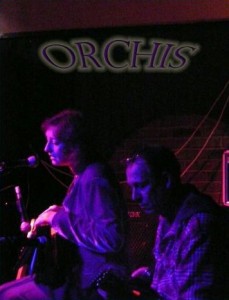 Well they’re all different, and so, all differently important… Temple Music is more ‘my’ project than the others… Steve and I are the only permanent members, and we are so attuned to what we want and like that we might as well be the same person… so anything I do I know Steve will be happy with, and vice versa. Temple Music has aspects of everything else involved in it, but because we’re interested in extending ideas to their limit it tends to be quite immersive… so if we’re doing a Temple Music project it is pretty much to the exclusion of all else, and I won’t be doing anything else until it’s finished… obviously, there are single tracks for compilations that don’t take that long, and can be fitted in with other things… such as Orchis tracks… There was an album called ‘Foxfire And Aconite’ (available from our Bandcamp page) under the name of Cunnan that was in effect an Orchis album, but without Amanda, which had songs on it destined for Orchis; two in particular –‘The Wizard of Carpathia’ and ‘Seven Sleepers Seven Sorrows’ Tracy is very fond of; we performed them live at the WGT in Leipzig in 2011 and they worked really well. We did an acoustic set in Coventry last year as well, which we were really happy with; Amanda has decided she doesn’t want to do live stuff so Orchis is now two bands… the studio band and the live one. We only ever intended to make one more Orchis album, and there have been quite a few things recorded for it that we ended up deciding not to use – some of them appeared on ‘Phoenix Trees’ (available from pretty much all digital download stores, or direct from DMMG ), some may be re-worked, and the central part of the recordings, ‘A Dream’ will come out as an ep on Infinite Fog (who reissued ‘A Thousand Winters’, and are planning to reissue ‘Mandragora’ this year). J Greco is remixing it for us… there are 5 tracks, and he’s done the first one ‘Kishmul’s Galley’…. So, Orchis remains very active and very important to me, and the new album (also on Infinite Fog) needs to be as good as we can make it… but because we can only work on it intermittently it’s taking a lot longer than we planned.
Well they’re all different, and so, all differently important… Temple Music is more ‘my’ project than the others… Steve and I are the only permanent members, and we are so attuned to what we want and like that we might as well be the same person… so anything I do I know Steve will be happy with, and vice versa. Temple Music has aspects of everything else involved in it, but because we’re interested in extending ideas to their limit it tends to be quite immersive… so if we’re doing a Temple Music project it is pretty much to the exclusion of all else, and I won’t be doing anything else until it’s finished… obviously, there are single tracks for compilations that don’t take that long, and can be fitted in with other things… such as Orchis tracks… There was an album called ‘Foxfire And Aconite’ (available from our Bandcamp page) under the name of Cunnan that was in effect an Orchis album, but without Amanda, which had songs on it destined for Orchis; two in particular –‘The Wizard of Carpathia’ and ‘Seven Sleepers Seven Sorrows’ Tracy is very fond of; we performed them live at the WGT in Leipzig in 2011 and they worked really well. We did an acoustic set in Coventry last year as well, which we were really happy with; Amanda has decided she doesn’t want to do live stuff so Orchis is now two bands… the studio band and the live one. We only ever intended to make one more Orchis album, and there have been quite a few things recorded for it that we ended up deciding not to use – some of them appeared on ‘Phoenix Trees’ (available from pretty much all digital download stores, or direct from DMMG ), some may be re-worked, and the central part of the recordings, ‘A Dream’ will come out as an ep on Infinite Fog (who reissued ‘A Thousand Winters’, and are planning to reissue ‘Mandragora’ this year). J Greco is remixing it for us… there are 5 tracks, and he’s done the first one ‘Kishmul’s Galley’…. So, Orchis remains very active and very important to me, and the new album (also on Infinite Fog) needs to be as good as we can make it… but because we can only work on it intermittently it’s taking a lot longer than we planned.
Twelve Thousand Days is very close to my heart, and Martyn is a very dear and close friend; and we have discovered that we can only really make it work when we are in the same room together… we tried recording separately, but it just didn’t happen… so it is very dependent on our individual schedules. We also performed in Coventry last year, which was great… we have had two excellent recording sessions recently, so we have a new album done in the raw, and I plan to finish mixing and sequencing some time later in the year.
You once said in an interview that when you started with Orchis you were not that enthusiastic about a lot of aspects of folk music and you mentioned that it was quite necessary to ”fuck up tradition“ and make the lyrics relevant for today. I think that is something that is missing in the work of a lot of artists who try to connect to a folk tradition. Who do you feel is quite successful in making folk relevant, fresh and inspiring today (apart from your projects, of course ![]() )?
)?
I’ve been doing a lot of work in this area recently, and your question has a lot of ramifications… It seems that everywhere else in the world, other than England & America, the ‘folk tradition’ is a continuum… bands, musicians – mainstream and otherwise – think nothing of using their influences – it is much more unconscious… so you’ll get a band like Korplikaani using Finnish polka music as a basis for metal, and it’s a completely natural thing. In England there is a huge disconnection between ‘traditional’ culture and ‘modern’ culture; unless you actively seek it out you will have no knowledge whatsoever of traditional English music, and if you do seek it out everything is prescribed and proscribed by bores like Martin Carthy, Ewan MacColl, Pete Seeger etc; essentially, if you don’t do it the way it was recorded by Cecil Sharp, Percy Grainger et al, then you shouldn’t do it at all. ‘Folk Rock’ in the UK did at least make a stab at this, and there are a lot of bands I really like – Mr Fox, Trees, Dulcimer, Pentangle, Kaleidoscope, Steeleye Span, Fairport Convention – who adapted folk songs for the rock idiom – but this meant that the songs were just sped up a bit and drums & electric instrumentation added. It’s a very different thing from a continuing and evolving tradition. So that’s kind of what we’re left with – either the stilted and stultifying renderers of ‘the tradition’, people who write ‘in the tradition’, or rather self conscious ‘rocked up’ versions that are otherwise ‘authentic’. The Pogues are a fantastic example of how it can, and should be done; but they are part of a continuing Irish tradition. The Men They Couldn’t Hang have done some great stuff, and I like a lot of The Oyster Band; Martyn Bates, Current 93 and Sol Invictus, and to a much lesser extent Death In June, are, I think, in the genuine ‘folk tradition’… also Andrew King, Sedayne, Sproatley Smith, The Hare And The Moon… all of these, and many others, are fucking things up nicely – but it would be wrong to say that it’s anything more than of a very minor minority interest… I think there are plenty of people who are contributing in different ways, but in England there is such a massive disconnection between the music of pre-1900 and now, far more than anywhere else – America to a degree, although that is a different case – that the relevance of folk music to most English people is gone forever.
Since the early days of Orchis, you combine folk inspired music with an interest in the spitirual and the occult. How did you find out, how much these things are connected to each other and what can you tell us about your first encounter with these things?
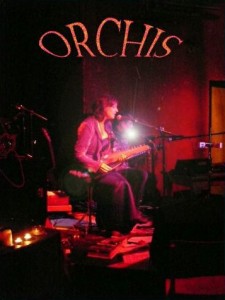 All three of us have always been independently interested in different aspects of the occult/spiritual realm… Tracy and Amanda in a much more ‘formal’ way than me – I’m not a great joiner of organisations… Music you create should and must reflect your interests and pre-occupations; and music as a part of life was what ‘folk’ music was – songs for the seasons, for occasions, for hope, for mourning, for remembering, for hating, for loving – an integral part of your life and who you are. The first thing I specifically remember coming across were the books of T Lobsang Rampa; a terrific fraud, as it turned out, and which I read around about the same time as The Alexandria Quartet by Lawrence Durrell, which led me to investigating a particular form of Gnosticism and all things leading from it… at the same time I came across Idries Shah, and it seemed apparent that all these different schools of thought were talking about the same thing. The Sufi teaching is that where there is a need, a teacher arises – but, importantly, that teacher and those teachings are only relevant to the people taught at the time they are taught it. Fossilized thought helps no-one, and simply causes the rise of organisations that only further their own continued rise. So slavishly following any doctrine is pointless, counter-productive and probably harmful. And yet, all such doctrines have arisen from the same principles. Personally, I have reached an understanding, and any music I do will reflect some aspect of that understanding; and that is how it should be.
All three of us have always been independently interested in different aspects of the occult/spiritual realm… Tracy and Amanda in a much more ‘formal’ way than me – I’m not a great joiner of organisations… Music you create should and must reflect your interests and pre-occupations; and music as a part of life was what ‘folk’ music was – songs for the seasons, for occasions, for hope, for mourning, for remembering, for hating, for loving – an integral part of your life and who you are. The first thing I specifically remember coming across were the books of T Lobsang Rampa; a terrific fraud, as it turned out, and which I read around about the same time as The Alexandria Quartet by Lawrence Durrell, which led me to investigating a particular form of Gnosticism and all things leading from it… at the same time I came across Idries Shah, and it seemed apparent that all these different schools of thought were talking about the same thing. The Sufi teaching is that where there is a need, a teacher arises – but, importantly, that teacher and those teachings are only relevant to the people taught at the time they are taught it. Fossilized thought helps no-one, and simply causes the rise of organisations that only further their own continued rise. So slavishly following any doctrine is pointless, counter-productive and probably harmful. And yet, all such doctrines have arisen from the same principles. Personally, I have reached an understanding, and any music I do will reflect some aspect of that understanding; and that is how it should be.
It’s said that songs by Orchis have been used in rituals. What can you tell us about these sessions?
All the songs ever recorded by Orchis have a point to them, as I mentioned earlier… and whilst, as I said, any music I do reflects my own understanding, if music is made with others for some specific purpose then obviously they bring their own understanding and intent to that music, and we would all support that specific intent in our own ways. Rituals are used to focus, and everybody has their own preferred method; the one that is right for them. Our ritual sessions have mainly been dictated by ‘traditional’ considerations – the correct hours, days, materials – for the purpose in hand. So some of these are for our own purposes, and not recorded; some are recorded. The first one was ‘Waiting For The Moon’ on ‘The Dancing Sun’, and one of the ‘best’ was ‘Anadiomene’ on ‘Mandragora’. The sessions which produced ‘Jennet’ (which was a shape-changing charm, as was ‘The Wizard Of Carpathia’) and ‘He Walks In Winter’ were particularly memorable, being solstice and equinox, and ‘Blood Of Bone’ was terrific… it was engineered to enable the raising of a Cone of Power – we also performed it at midnight on All Hallow’s Eve at Fell Foot Woods in 2010, which was incredible.
As you have dealt with numbers of pagan aspects in many of your works, we would like to know how you think about the main developments of contemporary paganism. How would you estimate the challenge, that a more global lifestyle (who shapes the consciousness of anyone who’s not a hermit at least to a certain degree…) means to a spirituality of a more local orientation? Do you think that this also forms neurotic defense mechanisms in some groups?
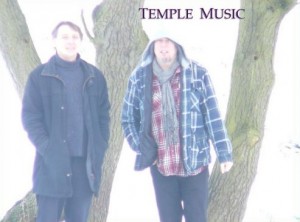 Sadly, most of it is utter drivel. As you say, unless you want to bow out of the world entirely, aspects of it have to affect your life; but most of the Pagan World seems to exist by saying what it is not, rather than what it is, and picking and choosing whatever aspects of Paganism – by which they seem to mean anything non-christian, Islamic or jewish – oh, except the Qabbala of course – suits them. Usually the easiest aspects, or the most pleasant, or the most self-justifying. American Express, Visa, Access etc have certainly missed a trick by not issuing a Druid card which could be used to buy obsidian daggers, essential incenses and sacrificial lambs, collecting Mistletoe Points as you go. One of the essential Sufi teachings is to be IN the world but not OF it, which means to me that of course you have to take on what the modern world is, but that it should not affect the essential you; that you should work constantly so that the essential you can develop and achieve understanding of the world and our place in it. We are here for a short time, and are a long time dead; and there is no going back to any perceived Golden Time – most of which were very far from golden for the vast majority of the people living it; and it seems evident to me that the kernel of all ‘religious’ teaching is essentially the same, although couched in terms necessary for the understanding of those teachings at the time and in the place they are taught. So it is a waste of time trying to follow some ancient prescription for spiritual growth or happiness, or whatever you want to call it – although you must find your own path before you can follow it, it will be your path. So it is entirely valid to use the pick and mix method for this purpose – that is, to take perhaps the less palatable aspects of various teachings, that are, nevertheless, true; and synthesise from them a working philosophy. I’d estimate that 90%+ of pagan borrowings are not this. Personally, I think that every locus in space and time has it’s own character, a manifestation of some genius loci that is somehow connected to all points of space and time… so we have different god-aspects at different places; and some of these do de-evolve away from being a personal ‘revelation’ to being a movement. All young movements are jealous of their territory, and subject to ‘neurotic dense mechanisms’…
Sadly, most of it is utter drivel. As you say, unless you want to bow out of the world entirely, aspects of it have to affect your life; but most of the Pagan World seems to exist by saying what it is not, rather than what it is, and picking and choosing whatever aspects of Paganism – by which they seem to mean anything non-christian, Islamic or jewish – oh, except the Qabbala of course – suits them. Usually the easiest aspects, or the most pleasant, or the most self-justifying. American Express, Visa, Access etc have certainly missed a trick by not issuing a Druid card which could be used to buy obsidian daggers, essential incenses and sacrificial lambs, collecting Mistletoe Points as you go. One of the essential Sufi teachings is to be IN the world but not OF it, which means to me that of course you have to take on what the modern world is, but that it should not affect the essential you; that you should work constantly so that the essential you can develop and achieve understanding of the world and our place in it. We are here for a short time, and are a long time dead; and there is no going back to any perceived Golden Time – most of which were very far from golden for the vast majority of the people living it; and it seems evident to me that the kernel of all ‘religious’ teaching is essentially the same, although couched in terms necessary for the understanding of those teachings at the time and in the place they are taught. So it is a waste of time trying to follow some ancient prescription for spiritual growth or happiness, or whatever you want to call it – although you must find your own path before you can follow it, it will be your path. So it is entirely valid to use the pick and mix method for this purpose – that is, to take perhaps the less palatable aspects of various teachings, that are, nevertheless, true; and synthesise from them a working philosophy. I’d estimate that 90%+ of pagan borrowings are not this. Personally, I think that every locus in space and time has it’s own character, a manifestation of some genius loci that is somehow connected to all points of space and time… so we have different god-aspects at different places; and some of these do de-evolve away from being a personal ‘revelation’ to being a movement. All young movements are jealous of their territory, and subject to ‘neurotic dense mechanisms’…
You said in an earlier interview that Martyn Bates hated Orchis at the first encounter, but then later became intriegued by it’s peculiar charm. Do you think that Orchis play a sort of music that requires time? What are the most extreme reactions you had ever received?
Music is a personal thing; what means a lot to one person can mean nothing to another; as a listener you bring to a piece of music all your own knowledge and associations. There are two parts to music: ‘art’ and ‘entertainment’ – and the more common knowledge and associations they contain, the more they become entertainment and the less they become art. Communication is at the basis of music… with successful classical music it is following particular rules based on a broad and longstanding cultural agreement to achieve communication of emotions, impressions etc. In pop/rock type music, this is entirely entertainment, showbiz, music biz, whatever and has no actual value beyond what associations you bring to it as a listener. It presses buttons, and you respond. The more general it is, i.e. the less it has to say, the more successful it is. I’m not knocking it, by the way, I like a huge amount of music! – it just is what it is. The kind of music we do, and the kind of music we are bracketed in with, is trying to communicate something very personal, with no associations for the listeners; or very few. It is successful if we feel it is successful, not if others ‘like’ it, and that necessarily makes it difficult to listen to… we are not being deliberately obscure or obtuse if we create something with ‘wrong’ notes or buried lyrics or jarring instrumentation – it’s something we could easily change, after all, which would make it more successful for others… but less successful for us. But it has it’s own logic, and if you listen to it properly, then it will do what it is supposed to. Western ears, for instance, became unattuned to quartertone type music – Indian, Japanese, Chinese, Greek, Turkish, Arabic – the rest of the world, in fact – due to the prevalence of the Classical and later Pop traditions – but it doesn’t sound too alien these days…
I suppose the most extreme reactions really have been with Temple Music – mostly because that’s the majority of the live shows I’ve played, and record review stuff isn’t usually extreme. We had one show where a woman ran out screaming; the rest of the audience were mesmerized and the organisers tried – and failed – to turn us off (they’d foolishly let us set up the sound ourselves)… at another I thought we were going to die as it was full of scaffolders; the bar staff insisted that the plug was pulled or they would walk out, and afterwards some of the scaffolders came up and said it was the best thing they’d seen since Tangerine Dream… actually there are plenty of TM stories like that, though we’ve calmed down a bit these days…
How did you and Martyn meet, and which were the ideas that resulted in the new group 12000 Days?
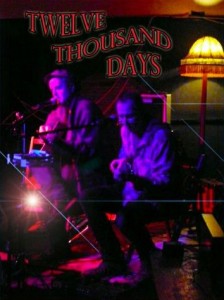 Eyeless In Gaza got in contact with World Serpent about distribution of the ‘Streets I Ran’ ep, and Martyn and I hit it off… as you said, he originally hated Orchis (I’d given him a copy of The Dancing Sun), but once it had wormed it’s way inside him with it’s peculiar charm he suggested singing on some Orchis stuff … I think it might have been the song ‘Burning Incense’ – but that was certainly one of the first we recorded – anyway, he agreed, but when Tracy heard us rehearsing it she said it had completely its’ own character, and that we should do something different to Orchis… so it is really down to her. Martyn and I agree on why a great deal of modern ’folk’ music is shit, but he is far more steeped in it than me, so he is more interested in re-interpreting the canon than I am… but other than that, we are complementary. With Twelve Thousand Days we are trying to express the extreme antiquity of the Land… the Heart of the Land… in a very English way… for our own benefit, really…
Eyeless In Gaza got in contact with World Serpent about distribution of the ‘Streets I Ran’ ep, and Martyn and I hit it off… as you said, he originally hated Orchis (I’d given him a copy of The Dancing Sun), but once it had wormed it’s way inside him with it’s peculiar charm he suggested singing on some Orchis stuff … I think it might have been the song ‘Burning Incense’ – but that was certainly one of the first we recorded – anyway, he agreed, but when Tracy heard us rehearsing it she said it had completely its’ own character, and that we should do something different to Orchis… so it is really down to her. Martyn and I agree on why a great deal of modern ’folk’ music is shit, but he is far more steeped in it than me, so he is more interested in re-interpreting the canon than I am… but other than that, we are complementary. With Twelve Thousand Days we are trying to express the extreme antiquity of the Land… the Heart of the Land… in a very English way… for our own benefit, really…
When listening to 12000 Days and comparing your approach to that of what Martyn and Mick Harris did on the “Murder Ballads”-trilogy would you say that there are more similarities than differences and that both projects strive(d) to find an original idiom for an old form?
Well, Murder Ballads had a very distinct intention, and with Mick, a very distinct sound, whereas with Martyn and I we’re never quite sure what is going to happen; the surprising thing to me is that whatever we do we sound very distinctive… but yes, I would think that is in general true… we don’t set out to reinterpret folk songs as such, more folk ideas, I think, whereas Mick and Martyn are laying bare the intent of the songs… so, I think that there are more differences than similarities, but we are both certainly trying to find a new way of expressing old forms…
You mentioned that in 12000 Days it is clear that Martyn normally does the vocals. Could you imagine you doing the majority of the singing or would that then morph into something completely different?
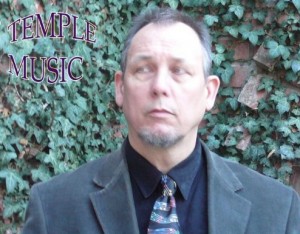 I just don’t sing well enough to do 12000 Days stuff… ‘my’ songs are initially demoed with me singing them, but they always sound a bit rubbish… and once Martyn has done a vocal they make mine sound even worse… I did a small solo tour acoss Europe last year which I did some vocals on… something I wrote especially called ‘Drift’ and an extremely abstract and spaced version of Syd Barrett’s ‘Dominoes’, each of which was around 15 minutes long, which made me think maybe I should do more vocals… there was already a song earmarked for Temple Music called ‘Children Of The Sun’ which we’d performed live a few times, and which became the title song of the new TM album, which are all song based tracks. I really like it, but Steve thinks that as we have access to several far more talented vocalists I should shut the fuck up. ‘Children Of The Sun’ is coming out on vinyl via Anticlock in the USA… we did a version (an Art Edition CDR) to sell at the shows we did with Language Of Light in October 2011, and Anticlock may have a couple of copies left; I think they are using them as promos. There are 5 tracks – ‘Mirrors, ‘Children Of The Sun’ ‘Ism’ ‘Death Went Fishing’ (which is a free translation of a Greek Rembetika song), ‘Momentum’ and ‘Warlord of The Royal Crocodiles’ (an old Tyrannosaurus Rex song). So this is what it sounds like if I sing more songs… morphing into something different… we also did try recording ‘No Return’ as a Twelve Thousand Days piece with both Martyn and I singing, but I never really felt it worked, and eventually Orchis recorded it as the first track of the new album.
I just don’t sing well enough to do 12000 Days stuff… ‘my’ songs are initially demoed with me singing them, but they always sound a bit rubbish… and once Martyn has done a vocal they make mine sound even worse… I did a small solo tour acoss Europe last year which I did some vocals on… something I wrote especially called ‘Drift’ and an extremely abstract and spaced version of Syd Barrett’s ‘Dominoes’, each of which was around 15 minutes long, which made me think maybe I should do more vocals… there was already a song earmarked for Temple Music called ‘Children Of The Sun’ which we’d performed live a few times, and which became the title song of the new TM album, which are all song based tracks. I really like it, but Steve thinks that as we have access to several far more talented vocalists I should shut the fuck up. ‘Children Of The Sun’ is coming out on vinyl via Anticlock in the USA… we did a version (an Art Edition CDR) to sell at the shows we did with Language Of Light in October 2011, and Anticlock may have a couple of copies left; I think they are using them as promos. There are 5 tracks – ‘Mirrors, ‘Children Of The Sun’ ‘Ism’ ‘Death Went Fishing’ (which is a free translation of a Greek Rembetika song), ‘Momentum’ and ‘Warlord of The Royal Crocodiles’ (an old Tyrannosaurus Rex song). So this is what it sounds like if I sing more songs… morphing into something different… we also did try recording ‘No Return’ as a Twelve Thousand Days piece with both Martyn and I singing, but I never really felt it worked, and eventually Orchis recorded it as the first track of the new album.
Temple Music seems much more abstract in structure than the bands mentioned above. How different is your approach to composing, improvising and writing music in the context of the several groups?
I tend to write either ‘songs’ or ‘compositions’, and the process is actually quite different… the ‘songs’ are almost always for 12000 Days, Orchis or Cunnan (the Cunnan album, ‘Foxfire And Aconite’, is in effect the 4th Orchis album, as I mentioned earlier), whilst the ‘compositions’ are almost always for Temple Music. With the songs, I have a very specific aim in mind, and it starts with the lyrics… they have to be completely right first. Language is very important; and actual meaning is not necessarily conveyed by the surface meaning of the words; and I want the meaning to be apparent on a variety of levels. Once I start on the music, it soon tells me what type of song it is, to a large extent… whilst I don’t write the music with a specific voice in mind, some songs work with some voices and not with others. Orchis song structures are fixed immediately, and don’t often change that much, whilst Twelve Thousand Days are far more fluid, with the structure just an idea roughly sketched; Martyn and I work on that aspect together. The basic structure I map out using guitar or dulcimer, and take it from there… to a large extent, it does depend what instrument I use as to how the final song turns out. Temple Music, on the whole, uses no language, and tries to convey meaning using non-vocal sounds alone. Temple Music pieces are very specific to time and place, and we are trying to … raise the soul of that place… is the best way I can put it. Sometimes it is an actual place, as with ‘The Green Man’ series, where we will record in the location, sometimes, as in ‘Soon You Will All Die…’ it’s a more theoretical place. We will identify the correct musical mode for that place, and work out individual parts we intend to use; and then map out a narrative arc that we will all follow. So the pieces are structured, but loosely so, although the individual parts of that loose structure are quite formalized.
Can you tell us a bit about the Greek music, that Temple Music is influenced by and which aspects of it flowed into your own compositions?
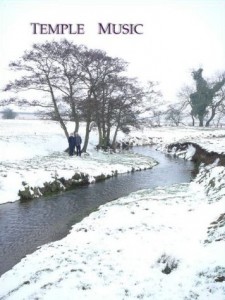 Amanda used to run an occult meeting/lecture group in London called Talking Stick which eventually became magazines and books of the same name, and Tracy wrote an article for one of the volumes on ancient Greek modes, which is what the modern modes are named after – Aolian, Lydian, Dorian and so on. Each of these ancient modes was specific to a particular god, or aspect of a god, and was used in specific ceremonial practice… although we don’t know exactly what those ancient modes were. There were a few pieces written down, but not many, and they can only give a relative guide to the tunes since we don’t know the actual notes they refer to… however, the ancient instruments can, and have, been reproduced, so we have a reasonable idea of the sort of music that could have been created. I was particularly interested in the specificity of it – that certain modes and instruments were used for certain things; but I wasn’t interested in trying to reproduce something from 2 or 3 thousand years ago… it is more that, with Temple music – certainly for live shows, and very much with the Green Man series – we try to, if you like, raise aspects of the particular god of that time and that place using our own particular instruments and modes.
Amanda used to run an occult meeting/lecture group in London called Talking Stick which eventually became magazines and books of the same name, and Tracy wrote an article for one of the volumes on ancient Greek modes, which is what the modern modes are named after – Aolian, Lydian, Dorian and so on. Each of these ancient modes was specific to a particular god, or aspect of a god, and was used in specific ceremonial practice… although we don’t know exactly what those ancient modes were. There were a few pieces written down, but not many, and they can only give a relative guide to the tunes since we don’t know the actual notes they refer to… however, the ancient instruments can, and have, been reproduced, so we have a reasonable idea of the sort of music that could have been created. I was particularly interested in the specificity of it – that certain modes and instruments were used for certain things; but I wasn’t interested in trying to reproduce something from 2 or 3 thousand years ago… it is more that, with Temple music – certainly for live shows, and very much with the Green Man series – we try to, if you like, raise aspects of the particular god of that time and that place using our own particular instruments and modes.
It seems that with Temple Music you like to discover aspects of decay and of the imperfection of life. The video to „Rotting from the inside“ and it’s sarcastic discourse about (e.g. genital) diseases might be one of the most direct examples. Is the destruction of idealist ideas on humanity something that fascinates you?
We wrote Rotting From The Inside after Priapus 23 of Akoustik Timbre Frequency asked us to do a track for Dark Ambient vol II. My mother had just been diagnosed with terminal cancer, and I had been planning to do something about the decay of society… just a tiny subject I know… that whilst things can appear to be fine on the surface they are actually already rotting from the inside. It seems to me that in general we don’t really want to confront reality as it is, or the consequences of actions undertaken and so on… we would prefer to be optimists rather than pessimists. We don’t like realism and reality and flee from them. High moral ideals, or whatever language framework one uses to describe them, last only as long as the particular person promoting them is around to do so. As soon as that person is no longer present, the idea, or ideal, or whatever it is, is corrupted by followers or disciples; it’s simply human nature. This is a political and societal as well as a religious thing, and stems essentially from this failure to confront reality, however it is dressed up. It doesn’t suit the status quo, the powers that be, the people in charge – whatever paranoid construct you care to name that people/organisations behave differently.
In your album „Soon you will all die and your lives will have been as nothing“, music, words and artwork form some sort of mysterious narration, and the eponymous statement is way drastical. Who are the portrayed persons on the cover? Are they the transmitters of the words and if yes, what do you think is there reason to disenchant the quick so very much?
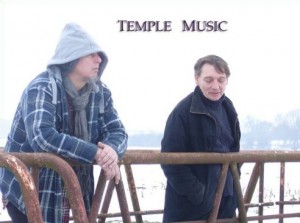 This actually follows on pretty neatly from the last question… we are really proud of ‘Soon You Will All Die…’ and I think it is a completely successful album; a really exact and pointed work. There is no great afterlife in the sky or anywhere else; when you’re dead you’re dead, and everything you have done and achieved in you life will be lost and forgotten over time… whether that is longer or shorter, eventually it is true. I don’t know who the person on the cover was, but I do know that they were alive and are now dead; and that I know nothing about them… I found the picture in a junk shop, along with the others that are on the back of the sleeve… and a pressed flower that is also on the back of the sleeve… I was looking at them, and the title came to me. Steve and I determined that it would be a single piece, and it represents the last hour of someone’s life, and that person is the woman on the cover. The pieces, or songs, are her internal narration of that last hour… the memories that trigger other memories until the last moments arrive… which sounds grim, unpleasant… but I wanted to make it more a peaceful acceptance… I find the finished piece to be quite uplifting…
This actually follows on pretty neatly from the last question… we are really proud of ‘Soon You Will All Die…’ and I think it is a completely successful album; a really exact and pointed work. There is no great afterlife in the sky or anywhere else; when you’re dead you’re dead, and everything you have done and achieved in you life will be lost and forgotten over time… whether that is longer or shorter, eventually it is true. I don’t know who the person on the cover was, but I do know that they were alive and are now dead; and that I know nothing about them… I found the picture in a junk shop, along with the others that are on the back of the sleeve… and a pressed flower that is also on the back of the sleeve… I was looking at them, and the title came to me. Steve and I determined that it would be a single piece, and it represents the last hour of someone’s life, and that person is the woman on the cover. The pieces, or songs, are her internal narration of that last hour… the memories that trigger other memories until the last moments arrive… which sounds grim, unpleasant… but I wanted to make it more a peaceful acceptance… I find the finished piece to be quite uplifting…
You spend (or spent) some time in a place in Greece and, if I remember it well, did a number of recordings there. How did you discover this place, and what can you tell us about this spot and it’s atmosphere?
I have a house on the southern part of the island of Evia, in the mountains. It’s an old stone house in a small village, very rural and about an hour’s walk from the sea. We get woken in the mornings by the sound of donkey hooves on the road outside, and we have our own orange, lemon and mulberry trees. I’ve sat for whole days under the trees watching the insects; at night the stars go on forever and polecats wrestle in the street. It’s the most beautiful place I know; but it isn’t the Greece of the travel brochures. It’s extremely poor, and the lives of people there are very hard; young people don’t want to stay in the village in grinding poverty – and who can blame them? – so the whole way of life is dying out. I’d been looking for a place that was ‘right’ in Greece for the last 20 years or so, and had just about given up – I didn’t want to be on one of the tourist islands, or too near Athens… although Evia is something like the third biggest Mediterranean island very few people have heard of it, so there’s no tourism… but it does have everything you need to live…
In England, you moved back to Lincolnshire after a longer time in London. Have you moved for practical reasons, or were the atmospheres of both places also a decisive factor for the change?
The main reason was because my daughter was coming up to school age, and we didn’t want her to go to any near where we lived in London… and London had changed a great deal over the time I was there. It wasn’t fun any more; and I’d never intended to stay there for as long as I did… We looked around near London for quite some time and then decided that you had to be an awful long way from London to actually be away from it. My parents still lived up in Lincolnshire, and we came back quite a bit… so we just thought ‘why not?’… I think the places where you grow up are always special to you. Lincolnshire has the most enormous sky, and it is full of strange and secretive corners; marshland, rolling hills, ancient ruins, prehistoric graves, Roman roads, seal colonies, wooded groves, more old churches than anywhere else in England… odd things happen here. The pagan past is just beneath the surface…
You have also contributed with three projects to the “John Barleycorn reborn: rebirth“-sampler. How do you feel about your role in this and do you think it would be possible to find a kind of common ground for all of the participants?
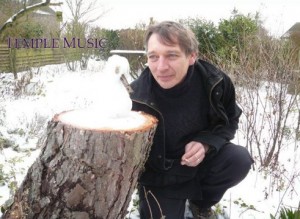 The whole thing was originally put together by Mark from Woven Wheat Whispers, who had some sort of vision of New Wyrd Folk… but it was his vision, not that of anyone on the compilation. What I found interesting was that there were – and are – all these people interested in, and working on, roughly the same areas in so many different ways… but, because they are all very individual, they are quite happy to just get on with things themselves. I think that’s just great… there’s no ‘scene’, and I don’t think there could be, because though it pulls together people of the same interests their music is extremely disparate. So the common ground would be that we are all a bunch of semi-obsessed loners doing our own thing…
The whole thing was originally put together by Mark from Woven Wheat Whispers, who had some sort of vision of New Wyrd Folk… but it was his vision, not that of anyone on the compilation. What I found interesting was that there were – and are – all these people interested in, and working on, roughly the same areas in so many different ways… but, because they are all very individual, they are quite happy to just get on with things themselves. I think that’s just great… there’s no ‘scene’, and I don’t think there could be, because though it pulls together people of the same interests their music is extremely disparate. So the common ground would be that we are all a bunch of semi-obsessed loners doing our own thing…
“The Wicker Man” played an important role for a number of artists. I’m not going to ask you what you think about the remake with Nicolas Cage but how do you feel that a kind of sequel (“The Wicker Tree”) is just about to be released after many delays?
Haha! Yes, it’s unbelievably terrible! R Loftiss mentioned The Wicker Tree to me the other day, and said it looked ok, but more than that I don’t know. I don’t think The Wicker Man is sacrosanct, or anything, and objectively it is not that great a film – good ideas, good set pieces, but not a great film… I’ll judge the new film on its’ merits!
As far as we know you are not directly involved in the group Hausfrauen Experiment, but as we admire their music and their ironic approach to things, we would like to know how it is going on with their plans?
Aha! In fact, Steve and I are the masterminds behind the Hausfraus; he is Mr. Muscle and I am Mr. Sheen. It was Lisa’s idea – she said something like ‘we’re all Hausfraus now’, and we thought it would be amusing to start a project to do only pop hits using only retro synths… so all five of us picked songs, and it so turned out that Vyolette, Tracy and Lisa’s voices worked incredibly well together, and off we went. We have an album finished, called ‘The End Of The World’, and we have been working on how to play it live before we go any further… we plan on trying an experimental show later this year to see how it goes… Vyolette has just had twins, so that has slowed things down; but, I guess… wait and see! The ‘End Of The World’ is coming! The Hausfrauen is tremendous fun to do, and has had a fantastic reaction… the next thing to see the light of day will be something for Fruits De Mer that I’m certain no-one will expect… we’ve also been asked to do an XTC session after out Fall session turned out so well, but, I think time is against us on that one.
Some time ago you stated that World Serpent was originally a rather idealistic endeavour but that the last four years weren’t that great. Would you like to say a few words about that?
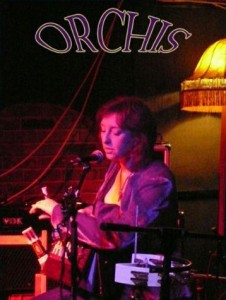 Well, people change, and what they want changes. Personally, I wanted to leave for ages before I actually did; as far as I was concerned I’d proved any point that I’d wanted to make. Everyone was older and had their own personal agendas to pursue in any case… As I’d started the company I felt responsible in some measure for the welfare of the artistes, and indeed everyone involved, but only up to a point; it needs reciprocation, and for the last four years or so that I was there, there was very little of that. And yes; WSD was idealistic – very much so – and I would much prefer to remember it that way. We brought a lot of music to people’s attention, and created a climate where it was possible for bands in that genre to be financially viable, and that can’t be a bad thing. One of the reasons I stayed as long as I did was because of the ridiculous court case that Doug Pearce tried to bring, so if his intention was to try and sink the company it’s rather amusing that it had the exact opposite effect! And even more so that I believe he still claims to have won a court case that never took place, rather than that, by receiving his own property in settlement of an aborted legal action, he simply received what he was anyway due – but two years late – WSD had already paid anything he was owed into a court fund, which he could’ve taken at any time! Still, like I said, the good far outweighs the bad.
Well, people change, and what they want changes. Personally, I wanted to leave for ages before I actually did; as far as I was concerned I’d proved any point that I’d wanted to make. Everyone was older and had their own personal agendas to pursue in any case… As I’d started the company I felt responsible in some measure for the welfare of the artistes, and indeed everyone involved, but only up to a point; it needs reciprocation, and for the last four years or so that I was there, there was very little of that. And yes; WSD was idealistic – very much so – and I would much prefer to remember it that way. We brought a lot of music to people’s attention, and created a climate where it was possible for bands in that genre to be financially viable, and that can’t be a bad thing. One of the reasons I stayed as long as I did was because of the ridiculous court case that Doug Pearce tried to bring, so if his intention was to try and sink the company it’s rather amusing that it had the exact opposite effect! And even more so that I believe he still claims to have won a court case that never took place, rather than that, by receiving his own property in settlement of an aborted legal action, he simply received what he was anyway due – but two years late – WSD had already paid anything he was owed into a court fund, which he could’ve taken at any time! Still, like I said, the good far outweighs the bad.
Do you think it would be possible to start something like World Serpent today in the current economical/technological climate?
I don’t really think so, no. Economically, the revenue per project is really too low now… there were only 3 of us at WSD, and that’s probably the minimum you could manage with that sort of model; there is an awful lot to do to maintain a release schedule, keep stock moving, maintain distribution etc. I think most genre labels now are hobby labels; they can’t exist financially on their own. This is partly because of cheap availability and file sharing, perversely – the easier it is to find things and the more there is of it, the less people buy. Also, I think people forget just how impossible it was to find things in the old days of about ten years back, haha, and how little info there was available. Most importantly, all the bands involved with WSD in the initial years shared an ethos; and it wasn’t music, or satanism, or nazism either – it is that the music they produced reflected their True Selves. Having said all that, I was recently asked this exact question, and, having given the same answer, am now in talks to set up something with a similar ethos, but run on completely different grounds…
Thanks for the interview and all the best for this year’s plans.
Thanks to you!
(M.G. & U.S.)
